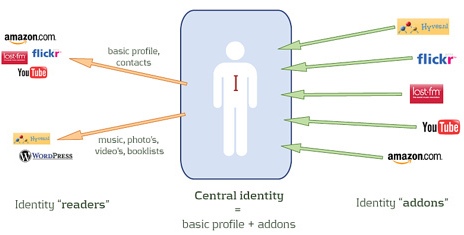
 I recently read a fascinating article from The NY Times “Growing Up on Facebook” written by a middle aged woman, Peggy Orenstein, about her experience on Facebook. After signing up for an account, the author reveals how she felt confronted with her past. She received friend invitations from nursery friends, high school teachers, and college chums and discovered pictures of her from when she was sixteen years old. She says, “Ever since I signed up a couple of months ago, I have felt thrust into a perpetual episode of “This Is Your Life” (complete with commercials)… I am by turns amused, touched and horrified by these gentle breezes and icy blasts from the past.” For the author, she had spent her entire life reinventing herself with each geographic move. She says, “as a survivor of the postage-stamp era, college was my big chance to doff the roles in my family and community that I had outgrown, to reinvent myself, to get busy with the embarrassing, exciting, muddy, wonderful work of creating an adult identity.” Facebook meant that these self reinventions were no longer possible. Were she to try and become a different person in a new city, her old self would cling to her electronically (Romans 7?).
I recently read a fascinating article from The NY Times “Growing Up on Facebook” written by a middle aged woman, Peggy Orenstein, about her experience on Facebook. After signing up for an account, the author reveals how she felt confronted with her past. She received friend invitations from nursery friends, high school teachers, and college chums and discovered pictures of her from when she was sixteen years old. She says, “Ever since I signed up a couple of months ago, I have felt thrust into a perpetual episode of “This Is Your Life” (complete with commercials)… I am by turns amused, touched and horrified by these gentle breezes and icy blasts from the past.” For the author, she had spent her entire life reinventing herself with each geographic move. She says, “as a survivor of the postage-stamp era, college was my big chance to doff the roles in my family and community that I had outgrown, to reinvent myself, to get busy with the embarrassing, exciting, muddy, wonderful work of creating an adult identity.” Facebook meant that these self reinventions were no longer possible. Were she to try and become a different person in a new city, her old self would cling to her electronically (Romans 7?).
She then wonders what it will be like for her nieces and nephews to grow up with Facebook and whether they will be equally hindered in their self-inventions. While I have had my fair share of awkward friend invites and unanswered wall posts, (I may be showing my age here), but I couldn’t disagree with the author any more.
Having been a part of Facebook for roughly 25% of my life, I have found that Facebook does not hinder changes in identities, but dramatically enables it. The day I got glasses for the first time in my life, I posted a picture of myself on Facebook and (instantly!) I became a card-carrying member of the coke bottle club. When my friends have had relationship difficulties, their status changes from “in a relationship with____” to “it’s complicated.” My profile allows me to post my favorite bands, books, quotes, movies, or anything else I’d like to make known. With each subtle or drastic change, the new identity has been given platform to make itself known.
Yet, this new, hyper-reality platform for my identity has had an unintended effect upon Facebook profiles. Instead of reflecting a true identity, the public scrutiny of Facebook has led to the creation of false, digital identities.
In my profile, I let the world know only what I want them to know about me. I edit my digital identity according to how I would like to be seen by other people. I may choose obscure bands to demonstrate my elite musical tastes (Hanggai?), or I join groups of causes I wish to support (the Free Rice Challenge). I do not include embarrassing details of my life (unless I think they’re funny, and would like others to laugh with me). If I lose my job, I simply remove it from my “info” tab with no fanfare. Profiles rarely reflect the pain and meaninglessness of life, yet it is the method by which I check in on old friends to see how they’re doing. They are about as honest as a job resume, or a 10-year high school reunion.
In this way Facebook represents a projection of my identity, instead of anything remotely accurate. The Facebook profile is the ideal self that one wishes to be. It is the future that has yet to be attained. At the root of it all, much (though not necessarily all) of the appeal of Facebook is that it provides a venue to receive the love and recognition of other people. I project the identity that I think will bring me the most comments. I earn people’s respect through demonstrating that I’m funny, cool, creative, thoughtful, etc.
Yet, the good news of Christianity is that “while we were still weak, at the right time Christ died for the ungodly.” We do not need to create an acceptable identity to be acceptable to God, rather God loves us in all of our ridiculous mess. Yes, God loves neurotic type A’s, the lonely, the arrestingly insecure, Barry Manilow fans, the unemployed, and yes, even those who will forever re-live an embarassing picture.
Slight vulgarity warning:
<object width=”512″ height=”288″><param name=”movie” value=”http://www.hulu.com/embed/MP2TglbBCpVHlPH9C3gjiQ”></param><param name=”allowFullScreen” value=”true”></param><embed src=”http://www.hulu.com/embed/MP2TglbBCpVHlPH9C3gjiQ” type=”application/x-shockwave-flash” width=”512″ height=”288″ allowFullScreen=”true”></embed></object>

COMMENTS
4 responses to “Facebook and Identity”
Leave a Reply














great observations Todd. . . thanks for this.
Great job, Todd.
Loved it Todd!
Todd, really wonderful post.
As an illustration to your point that ‘Profiles rarely reflect the pain and meaninglessness of life’
http://www.youtube.com/watch?v=n8JSt9PQZT8